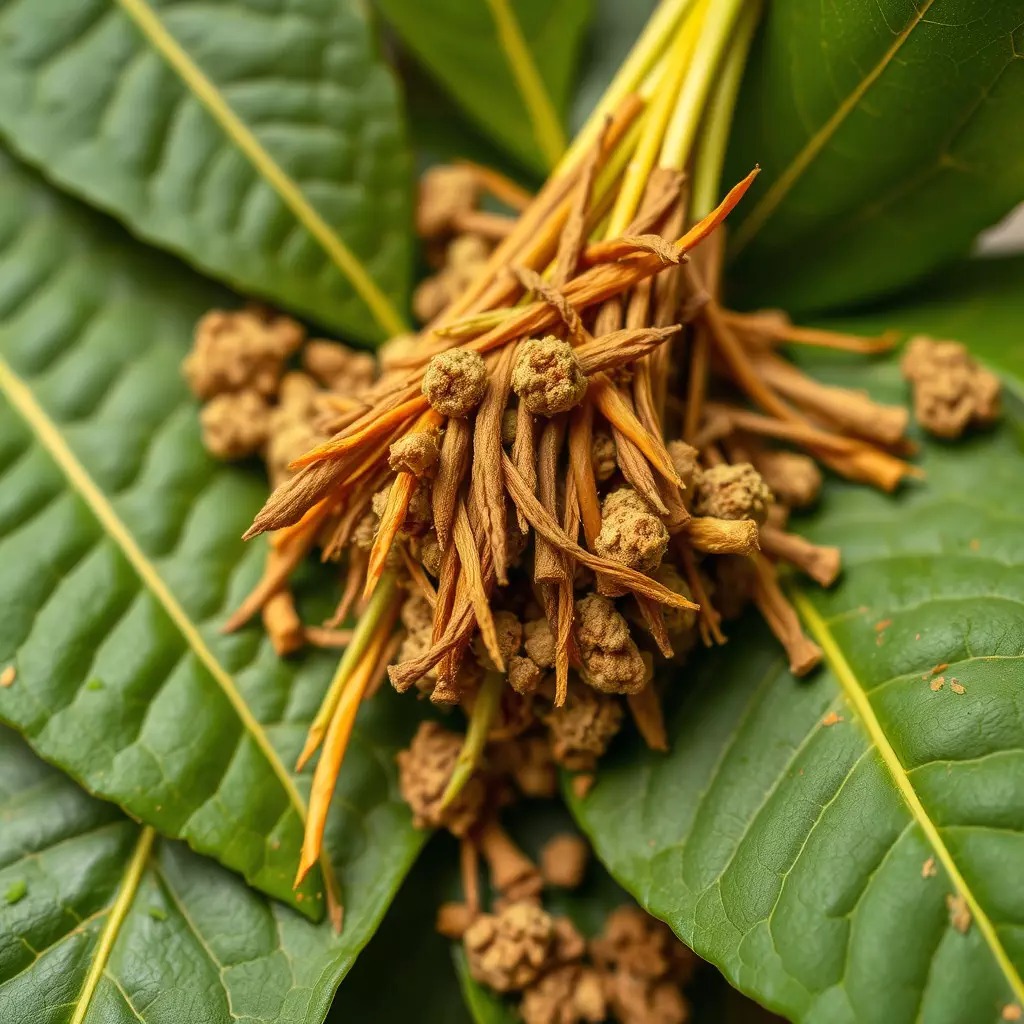Kratom, a tropical evergreen tree native to Southeast Asia, has gained attention for its potential role in emotional well-being and as a natural supplement. Its alkaloids, such as mitragynine and 7-hydroxymitragynine, engage opioid receptors, potentially influencing mood and energy levels. An energy boost with kratom is often touted by users for its ability to combat fatigue and enhance vitality and mental clarity. However, it's important to approach its use with caution due to side effects and the necessity of appropriate dosing. The legal status of kratom varies by region, and its long-term health implications remain under investigation. For those considering an energy boost with kratom, it is advisable to consult healthcare professionals to ensure it complements professional care when necessary and aligns with a holistic health strategy that includes a balanced diet, regular exercise, and quality sleep, alongside mindfulness or meditation practices. This comprehensive approach can support stress management systems and contribute to maintaining emotional stability while considering the individual responses to kratom and potential interactions with other health factors.
Exploring the intersection of natural wellness and emotional health, this article sheds light on Kratom’s potential in supporting one’s emotional well-being and energy levels. We delve into how Kratom can be a pivotal component within a comprehensive strategy for achieving balance and vitality. As we navigate through the benefits and considerations of its use, readers will gain insights into integrating Kratom effectively to enhance their emotional resilience and sustain higher energy levels. Join us as we uncover the nuanced role of Kratom in fostering well-being and its place within a holistic health regimen.
- Understanding Kratom's Role in Emotional Well-Being and Energy Levels
- Navigating the Benefits and Considerations of Using Kratom for Emotional Support
- Integrating Kratom into a Holistic Strategy for Maintaining Emotional Balance and Vitality
Understanding Kratom's Role in Emotional Well-Being and Energy Levels

Kratom, a tropical tree native to Southeast Asia, has garnered attention for its potential role in supporting emotional well-being and energy levels. The leaves of kratom contain compounds called alkaloids, primarily mitragynine and 7-hydroxymitragynine, which are thought to interact with the body’s opioid receptors, influencing mood and pain perception. Users often report an energy boost with kratom, particularly with strains like Maeng Da or White Vein varieties. This surge in energy is not just physical but can also enhance mental vitality, promoting a sense of focus and motivation that contributes to emotional well-being.
The impact of kratom on energy levels is multifaceted. Not only does it stimulate the central nervous system, potentially elevating mood and alleviating symptoms of depression or anxiety, but it also supports sustained mental performance throughout the day. This can be particularly beneficial for individuals who experience fatigue or low energy due to emotional stress or mental exhaustion. It’s important to approach the use of kratom with caution, as its effects can vary widely among users and its legal status differs by region. Proper dosing, adherence to local laws, and understanding the potential side effects are crucial for safe and effective incorporation of kratom into a holistic wellness regimen aimed at improving emotional well-being and energy levels.
Navigating the Benefits and Considerations of Using Kratom for Emotional Support

Kratom, a tropical evergreen tree native to Southeast Asia, has garnered attention in discussions surrounding emotional well-being and natural supplementation. Proponents often cite an energy boost with kratom as one of its notable effects, which can be particularly beneficial for individuals seeking support in managing fatigue or low energy levels associated with emotional challenges. The alkaloids present in kratom leaves, primarily mitragynine and 7-hydroxymitragynine, are believed to interact with the body’s opioid receptors, potentially influencing mood and energy levels. When used judiciously, it may offer a gentle yet noticeable uplift, promoting a sense of vitality and mental clarity that can be conducive to emotional well-being.
However, it is imperative to approach the use of kratom with caution and a comprehensive understanding of its effects. The benefits of an energy boost with kratom should be weighed against potential side effects and the need for careful dosing to avoid adverse reactions. Additionally, the legal status of kratom varies by region, and its long-term safety and efficacy remain subjects of ongoing research and debate. Users are encouraged to consult with healthcare professionals before integrating kratom into their emotional well-being support regimen, ensuring that it complements other holistic or therapeutic practices rather than replaces professional care when needed. By doing so, individuals can make an informed decision about whether kratom’s energy-boosting properties align with their personal journey toward emotional health and balance.
Integrating Kratom into a Holistic Strategy for Maintaining Emotional Balance and Vitality

Integrating Kratom into a holistic strategy for maintaining emotional balance and vitality can be a nuanced approach, particularly when considering its effects on energy levels and overall well-being. Kratom, a plant from Southeast Asia, has been traditionally used for its potential energizing and mood-enhancing properties. For individuals seeking an energy boost with Kratom, it’s crucial to understand the various strains available—such as Maeng Da or Bali—and their distinct impacts on energy and emotional state. The right strain at the appropriate dosage can provide a natural lift in energy without the jittery side effects often associated with caffeinated beverages or synthetic stimulants.
When incorporating Kratom into a holistic well-being regimen, it’s important to complement its use with other complementary practices. This includes a balanced diet, regular physical activity, adequate sleep, and mindfulness or meditation techniques. These lifestyle choices support the body’s natural ability to manage stress and maintain emotional equilibrium. Additionally, Kratom can be part of a broader mental health care plan that includes therapy and counseling services. By doing so, one can leverage Kratom’s potential benefits in harmony with these other supportive measures for a comprehensive approach to emotional well-being. It’s essential to consult with healthcare professionals before introducing Kratom into any wellness routine, as individual responses to Kratom can vary and it may interact with other medications or health conditions. With careful consideration and professional guidance, Kratom can be a valuable component of a holistic strategy aimed at emotional balance and vitality.
In conclusion, emotional well-being is a multifaceted aspect of health that can be supported through various means, including the careful integration of natural supplements like Kratom. This article has elucidated the nuanced relationship between Kratom and its potential role in enhancing emotional well-being and energy levels. It’s clear that while Kratom may offer an energy boost with kratom and a sense of emotional equilibrium, it is imperative to approach its use with a holistic strategy that encompasses other supportive practices. By doing so, individuals can navigate the benefits and considerations associated with Kratom, ensuring they maintain emotional balance and vitality in a way that aligns with their personal health journey. It’s essential to stay informed and consult healthcare professionals when integrating any new supplement into one’s routine to promote overall well-being responsibly.






